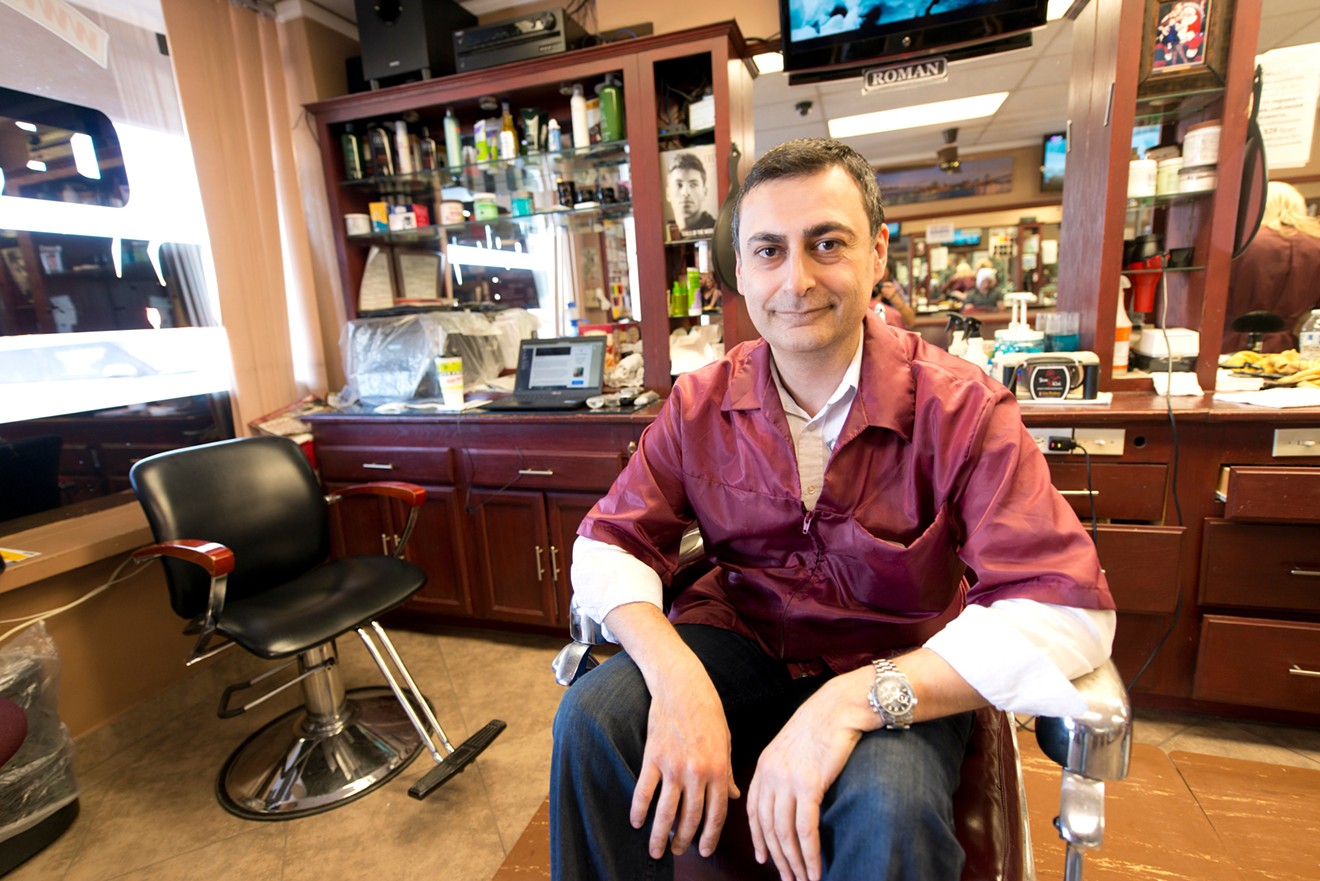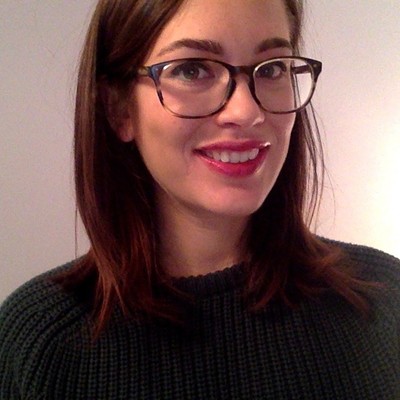This article is part of Phoenix New Times' issue focusing on immigrants in the Valley of the Sun. See our full coverage here.
At first glance, Central Barbershop seems like just another all-American place for men to get their hair cut. The walls are lined with photos of baseball players and paintings of the Brooklyn Bridge. Customers sit in old-fashioned leather chairs and talk about the Arizona Cardinals. The smell of hair tonic and aftershave fills the room.
Then you start to notice that the TVs in the shop at Central Avenue and Camelback Road are playing Russian music videos. And that all the barbers have strong Slavic accents and names like Boris. Like countless other barbershops in the greater Phoenix area, this one is run and staffed by immigrants from Russia.
Central Barbershop’s owner, Roman Nektalov, first came to America at the age of 18. It was February 1989, and he was a refugee from the former Soviet Union. For decades, Jews living in communist Russia had been persecuted for their faith, but were stuck in the country by emigration quotas that restricted the number of people who were allowed to leave.
In the late 1980s, however, that policy changed. Soon, hundreds of thousands of Jews began fleeing the country.
Some of the refugees went to Israel; Nektalov chose to follow relatives to New York.
Everyone in his family — parents, grandparents, siblings, cousins — were barbers in Tashkent, but he decided to take the opportunity to reinvent himself.
“When I came to the U.S., I wanted to do something different — change my destiny,” he says.
He drove limos, shuttles, and cabs; worked as a photographer; opened a restaurant; and ran a grocery store specializing in Russian and Eastern European products.
None of it stuck. Eventually, a little over a decade later, after following his sister and brother-in-law — a barber — to Phoenix, he returned to the family business. Now 46, he says it seemed like the obvious choice.
“I can do well for myself this way,” he says.
Many of the Russian barbers in the Valley have a similar story. The vast majority are Jewish refugees from what is now Uzbekistan, and self-identify as Russian because they grew up speaking Russian and not Uzbek. Most initially immigrated to New York, then moved out to Phoenix for the lower cost of living and the opportunity to move out of a tiny, cramped apartment and into a spacious suburban-style house.
The U.S. Census Bureau estimates that there are more than 10,000 people born in the former USSR who now live in Maricopa County.
It’s hard to say exactly how many Russian barbers there are in the Valley, since the Arizona State Board of Barbers doesn’t keep track of that kind of information. But as far as Nektalov knows, Phoenix is the only American city besides New York where there’s a true Russian barbershop scene, with multiple shops competing for the best barbers and the most customers.
Customers who aren’t Russian like to go to Russian barbershops because they see it as an affordable luxury, he explains.
“We pay lots of attention to little details,” he says. “We do the straight razor around the ears, the hot towel massage. At a regular barbershop, you don’t get that.”
His customers include none other than Phoenix Mayor Greg Stanton, who often brings his son with him.
Fascinating profile of Russian-born barber who cuts my hair. @phoenixnewtimes series puts faces to Phx immigrants. https://t.co/VgxFrIqC0S
— Greg Stanton (@MayorStanton) March 23, 2017
So how did Russians end up dominating the barbering business in Phoenix in the first place?
Jim Valenzuela, the owner of Mr. V’s Barbershop, believes it all started back in 1999. That was the year that he decided that he wanted to open an old-fashioned barbershop like the ones he’d gone to with his dad when he was a kid.
The only problem? He didn’t know how to cut hair. So he put an ad in the paper, looking for barbers.
“I had, in my head, pictured something out of a Disney movie — I’d have an Italian guy, a Mexican guy, a black guy, a United Nations of barbers,” he recalls.
But one of the first barbers who showed up turned out to be Russian — a Jewish refugee from the former Soviet Union.
“I really don’t know what brought him out here,” Valenzuela says. “He was working at Supercuts, but his skills were better than that. I hired him even though he had difficulty with the language, because it didn’t take long to realize the guy had great skill with his hands.”
Mikhail — whose last name Valenzuela can no longer recall — started calling up his friends and family who’d immigrated to New York, telling them that they should move out to Phoenix. Soon enough, the majority of the staff at Mr. V’s Barbershop was Russian. Every time Valenzuela opened up a new location, he found a surplus of talented Russian barbers waiting to fill those chairs.
As it turns out, Phoenix has a lot in common with Tashkent, the capital of Uzbekistan, which is where most of those barbers grew up. Tashkent, too, is a hot, sprawling city surrounded by mountains, with a dry climate and hot summers. Temperatures there often clear 100 degrees during June and July.
By the mid-2000s, the first Russian immigrants to arrive in Phoenix were starting barbershops of their own. They, in turn, brought over their friends and family to work as employees. The cycle repeated itself again and again as new arrivals landed at Sky Harbor Airport, felt the familiar dry air, and called relatives back in New York to tell them that they really ought to consider coming out to Arizona.
“When I first came out to Phoenix, in my mind, it was the desert,” Central Barbershop’s Nektalov remembers. “I thought there was nothing here — I didn’t expect to find a city. It reminds me of home.”












